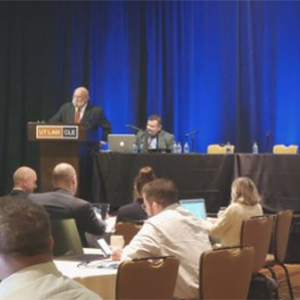
eCourse
Nonprofit Governance
Contains material from Apr 2024
Session 02: Governance: Managing an Internal Investigation - Explore the anatomy of an internal investigation from a governance perspective— from the allegations, through the first moves and the next steps, to the investigation’s findings and aftermath. An internal investigation can be a complex, fast moving and highly fraught legal experience not for the faint of heart and understanding the role of the board is imperative to a successful outcome. The scope (and costs) can easily get out of hand, and there are many landmines hidden throughout the process. Discuss the following with a special focus on the governance considerations: Who do you tell and when (the executive team, the executive committee, the board, key donors or other stakeholders)? What is the role of each stakeholder and how do you navigate disagreements? Do the allegations warrant a full-fledged investigation or would that be an over-reaction? Do you bring in outside counsel or other third parties (forensic accountants or other experts) and when? What is the proper scope of an investigation? What are the legal and privilege issues involved, in particular when interviewing employees and former employees? What are the communications/PR concerns? What do you do with the findings? Do you do a written report? What should come out of the investigation (employment actions, governance reforms)? Do you self-report to the IRS or other regulators? What do you make public and when? And what is the role of the board (or a board or special committee) in navigating each of these questions?
Includes: Video Audio Paper Slides
- Total Credit Hours:
- 1.50
- Credit Info
- TX, CA
- TX MCLE credit expires: 4/30/2025
Preview Sessions
Show session details
Darren B. Moore, Jeffrey E. Sher
Download session materials for offline use
Session 1
—46 mins
0.75
Governance: Essential Organizational Policies and Protections (Apr 2024)
A strong set of policies serve as a key building block in good governance and organizational effectiveness. This session offers an overview and discussion of a number of standard organizational policies to better understand not only the nature of the policies and their format but also what they are designed to accomplish and how they interact with insurance and tie into an overall compliance program.
Originally presented: Feb 2024 Nonprofit Organizations Institute
Darren B. Moore,
Bourland, Wall & Wenzel, P.C. - Fort Worth, TX
Jeffrey E. Sher,
Fizer Beck - Houston, TX
Show session details
James P. Joseph, Katherine Karl
Download session materials for offline use
Session 2
—44 mins
0.75
Governance: Managing an Internal Investigation (Apr 2024)
Explore the anatomy of an internal investigation from a governance perspective— from the allegations, through the first moves and the next steps, to the investigation’s findings and aftermath. An internal investigation can be a complex, fast moving and highly fraught legal experience not for the faint of heart and understanding the role of the board is imperative to a successful outcome. The scope (and costs) can easily get out of hand, and there are many landmines hidden throughout the process. Discuss the following with a special focus on the governance considerations: Who do you tell and when (the executive team, the executive committee, the board, key donors or other stakeholders)? What is the role of each stakeholder and how do you navigate disagreements? Do the allegations warrant a full-fledged investigation or would that be an over-reaction? Do you bring in outside counsel or other third parties (forensic accountants or other experts) and when? What is the proper scope of an investigation? What are the legal and privilege issues involved, in particular when interviewing employees and former employees? What are the communications/PR concerns? What do you do with the findings? Do you do a written report? What should come out of the investigation (employment actions, governance reforms)? Do you self-report to the IRS or other regulators? What do you make public and when? And what is the role of the board (or a board or special committee) in navigating each of these questions?
Originally presented: Feb 2024 Nonprofit Organizations Institute
James P. Joseph,
Arnold & Porter Kaye Scholer LLP - Washington, DC
Katherine Karl,
Caplin & Drysdale, Chartered - Washington, DC